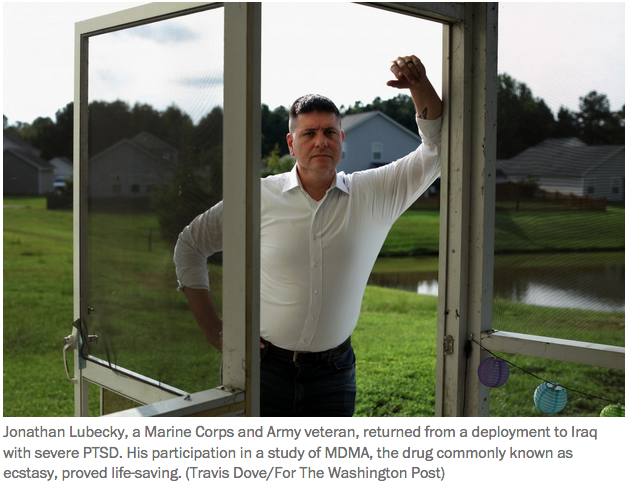WashingtonPost – Health & Science – Ecstasy could be ‘breakthrough’ therapy for soldiers, others suffering from PTSD – William Wan – Published: August 26, 2017
Feels like groundhog day. Washington Post correspondent, William Wan, recently wrote an article on MDMA titled “Ecstasy could Be a ‘breakthrough’ therapy for soldiers, others, suffering from PTSD” as if it were news. MDMA was developed for medical purposes at the turn of the century, and studied extensively for its therapeutic use in the 1970’s. Then, along came President Reagan with his slated to grandly fail ‘war on drugs’, which pushed MDMA research and use to become a criminal offense.
Wan’s article is valuable in that it’s bringing new research and awareness of the possibilities of help for veterans back into focus. It regrettably neglects other effective forms of treatment for combat PTSD, such as EMDR, Biofeedback and Somatic Experiencing, all currently approved by the VA and supported by clinical trials. Additionally, recent studies on the practice of daily yoga over 3-4 months reduced symptoms of PTSD. Anything that supports the re-regulation of the fight, flight, freeze response that’s stuck in hair-trigger vigilance for so many people with trauma is a viable therapy. And because the use of MDMA can support that cause, it’s past time for policy to allow those who suffer to access the treatment they need.
All experts in trauma therapy understand that rarely does talking about trauma process it out of the nervous system. In fact, talking about it generally exacerbates symptoms. MDMA has a “unique ability to flood users with intense feelings of euphoria. But as a byproduct, it also reduces fear and imbues users with a deep sense of love and acceptance of themselves and others — the perfect conditions for trauma therapy.” Again, this has been known since it’s prevalent use in the 1960s, until the political anti-hippie movement in shut it down in the early 1980s.
It’s time to stop depriving people who need treatment of the treatment they need.

